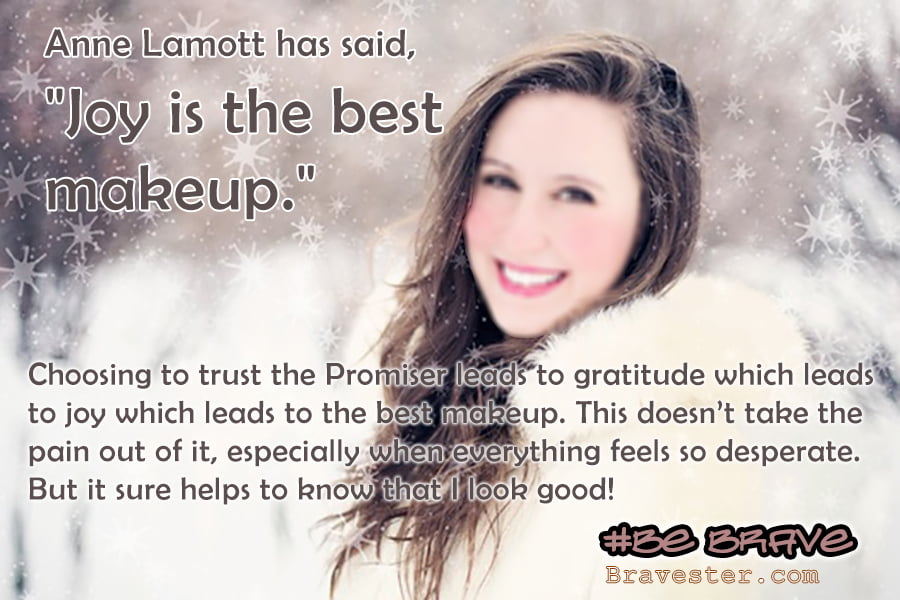Trusting the Promiser

It took only 19 years of marriage for John to remember to take out the garbage every week.
I can take out my own garbage. I lived single for 15 years. But when I got married there were three chores I couldn’t wait to pass on to someone else: taking out the garbage, filling my car with gas, and grocery shopping. I made this deal before we got married. John has done two of these well throughout our marriage but remembering to take out the garbage has been a stumbling block. There have been weekly promises—for 18 years. And then forgetfulness. Forgetfulness which then led to me becoming a nag. Not pretty.
This could be a cause for quite a fight, or a series of escalating fights. In every relationship there are occasional (or not so occasional) gaps or lapses. There are gaps between promises and performance. There are gaps between expected behavior and actual behavior. The problem comes in what do we do with those gaps.
Our brains innately fill those gaps with something. We can’t help ourselves. We try to make sense of the gap and how the promise didn’t mean anything or how what was expected never happened. In filling those gaps we have two directions we could go in: trust or suspicion. You either believe the best or suspect the worst. It always goes to each extreme, never something reasonable in the middle. Like there is a middle between trust and suspicion. I don’t think there is.
So for 18 years I had a gap with John and the garbage. I could have believed he cared very little about me which is why he always forgot to take out the garbage. Or that he doesn’t ever listen to me when I would remind him the night before. Or I could easily have ramped it up with all sorts of proof that he cares so little or chooses to not to listen because I had 18 years of proof. I can wind that up to be a pretty big fight.
But I chose to trust. I chose to fill the gap that none of this was intentional and that he really isn’t that stupid. I never gave him the excuse that something was more important than taking out the garbage. I tried to keep the 18 years of forgetfulness as just that. I chose trust over suspicion.
This same holds true with our relationship with God. When we are in need and we pray desperate prayers because the truth is we need a desperate solution, yet in that desperate emotional state it seems like God is doing nothing, our mind will fill in the gap as to why. Once again we choose between trust or suspicion. We can choose to trust and wait it through. Or we can choose to be suspicious and that leads to so many other behaviors. Raise your hand if you’ve ever done any of these behaviors:
- Gotten angry with God
- Cursed at God
- Tried to fix the situation in your own power
- Told God since you weren’t going to do anything, I am going to fix this in my own power.
- Made a decision that God is not for you, and never has been for you.
- Numbed yourself with a negative behavior. You chose this negative behavior because you couldn’t stand the doubts that being in this gap filled you with.
It is this gap that I’ve named holy tension. On each side of that gap there are certainties. Life is the way it is “supposed to be.” Then life hands us these moments and nothing seems certain any more. Literally nothing seems certain any more. This is so uncomfortable. To get out of the discomfort and back to certainty, we do something to fill in that gap. The hard truth is it is best to just sit in that gap for a season. What we more often tend to do is scramble to fill that discomfort.
It is easier to sit in that gap for a season when you trust the Promiser. (Note: This is never an easy season. Pain is the beginning.) 2 Peter 1:3-4 clearly tells us, By his divine power, God has given us everything we need for living a godly life. We have received all of this by coming to know him, the one who called us to himself by means of his marvelous glory and excellence. And because of his glory and excellence, he has given us great and precious promises. These are the promises that enable you to share his divine nature and escape the world’s corruption caused by human desires.
The Bible is full of these promises for us. Honestly, there are some things I read in the Bible that I wonder why they are there. I trust that there is a good reason but I wonder why. And then in the midst of my “this is in the Bible?” thoughts, there is a great Bible truth worth highlighting. Worth meditating on. Worth writing an article about.
I get why you may have troubles trusting the Promiser. Maybe you prayed and prayed and someone died. Maybe it seems like your prayers are never answered. Maybe you have father issues and can’t trust a father figure. Maybe you’ve been hurt by a church or someone in the church and you’ve transposed that hurt onto God. Maybe you feel shame for a current sin or a past sin. With all of these you are making the choice to choose suspicion to fill the gap instead of trust. Justified suspicion but you are still choosing this.
I ask you to do the brave thing and choose trust. Yes, I know the vulnerability of this request but that is why it is brave. Trust the Promiser. There is tension involved in this but it is holy.
Funny thing how trust builds trust. When it came to not having monster arguments over the garbage for 18 years, it helped that John was good at buying the groceries and keeping my car filled with gas. I knew the potential was there. I chose trust every time. Trust builds trust.
What are the things you can trust God for right now? For the sun rising every morning? For the laughter of your child? For the perfectly brewed coffee that you can expect and taste before you receive it? This is why practicing gratitude is a life changer. Practicing gratitude invites joy into our lives. When you practice gratitude you are acknowledging that there is joy to be had and that you have enough to share. Scarcity tells you that you are not enough which causes this fear inside of you which causes you to choose suspicion towards the Promiser. Gratitude for even the littlest of things invites joy in and suddenly you realize that you are worthy of this joy and scarcity can’t speak so loudly.
Anne Lamott has said,
“Joy is the best makeup.”
Brilliant.
Choosing to trust the Promiser leads to gratitude which leads to joy which leads to the best makeup. This doesn’t take the pain out of it, especially when everything feels so desperate. But it sure helps to know that I look good!
This is a brave step. This could be a transforming step in your faith which really means this could be a transforming step for your entire life and how you live and relate to others. Try. Trust the Promiser all the way through the holy tension til life has certainties again. And then don’t be surprised to find even more moments of joy in your life on the flip side.







Comments
Trackbacks & Pingbacks
[…] role here is to trust the promise of Philippians 1:6 and wait with hope (too often with bloody fists), making those Plan Bs because […]
[…] is part of the Bravester lifestyle. Not to be mad at God just because but to be mad at God because you fully trust Him and yet this part of your life doesn’t make sense—yet. You don’t think it is too unreasonable […]
[…] am learning to do this. I am learning to trust the Promiser. When my brain wants to lead to suspicion instead of trust (our brains do this), I choose to […]
[…] had your trust violated so many times. You just don’t have enough heart left to trust God. (Read Trusting the Promiser to give you some […]
[…] song, repeat your special Bible verse, ask your friend to “carry” you and make the change. Trust the Promiser because you are choosing to believe that God will redeem every bit of this painful […]
[…] still hurt. But you are trusting the Promiser with that hurt so you are beginning. You have no idea what God is doing in this hurt or how it can […]
[…] But I am impatient. The waiting takes bravery because waiting also requires vulnerability. Which is why we hate it so. We would rather scramble to fill the discomfort of this vulnerability than to fill the gap with trust. […]
[…] feeling the stress of your own parenting failure—and trusting God for the outcome anyway. This is trusting the Promiser even when your own mind fills in the tension with suspicion that God won’t come through and your […]
[…] may not know what this looks like now. But I trust the Promiser. So I have […]
[…] Then I look at this picture. I can depend on God when I know he is there like that. And he is! This is what I’ve learned over my years of trusting the Promiser. […]
[…] I’m braver. I’m more tender. I can make a Plan B (or Plan M!) because I have grown to trust the Promiser from the times I have dared God. Even with a Plan B in my head, my heart still gets smashed. Yet I […]
[…] can do it because I trust the Promiser. I’ve learned to trust the Promiser by putting myself in daring (i.e. vulnerable) positions. Yes, […]
[…] to do. This will be a blog series of five blogs. Stick with me for all five. Stick with the holy tension which will surely follow all the new learning and unlearning. And let’s see if forgiving that […]
[…] Plan A has crushed me at times. For example, prison is a daily part of my life. Plan A was the “supposed-to” part of my life. It was easy to hope when this was “supposed-to” happen. Of course I can hope when this “supposed-to” was in play. But it didn’t happen that way. Now I have a choice. I can keep on living in Plan A and throw a temper tantrum at God because he “promised” this “supposed-to” was going to happen. Or I can just numb myself to get through the discomfort of the reality that Plan A is not going to come to be. Or I can make the decision (and this is a me thing not a God thing) to find a Plan B. Out of my broken-heart I can find a way to set new goals; strengthen my tenacity muscles (Romans 5:3-5 so true!); because I believe worthiness is my birthright. I believe I am worthy of having something good happen to me—and my sons. I believe that God is for me. I believe that I still am the recipient of God’s promises for me because they are wider than my “supposed-to’s.” I trust the Promiser. […]
[…] Over on Be Brave I shared about this little innate thing our brain does when there are gaps between promises and performances in relationships. And gaps between expected behavior and actual behavior. To move us out of that place of discomfort that this gap puts us in, our brain innately fills in that gap with either trust or suspicion. Every gap gets filled with something. We can’t help it because there is dissonance otherwise. […]